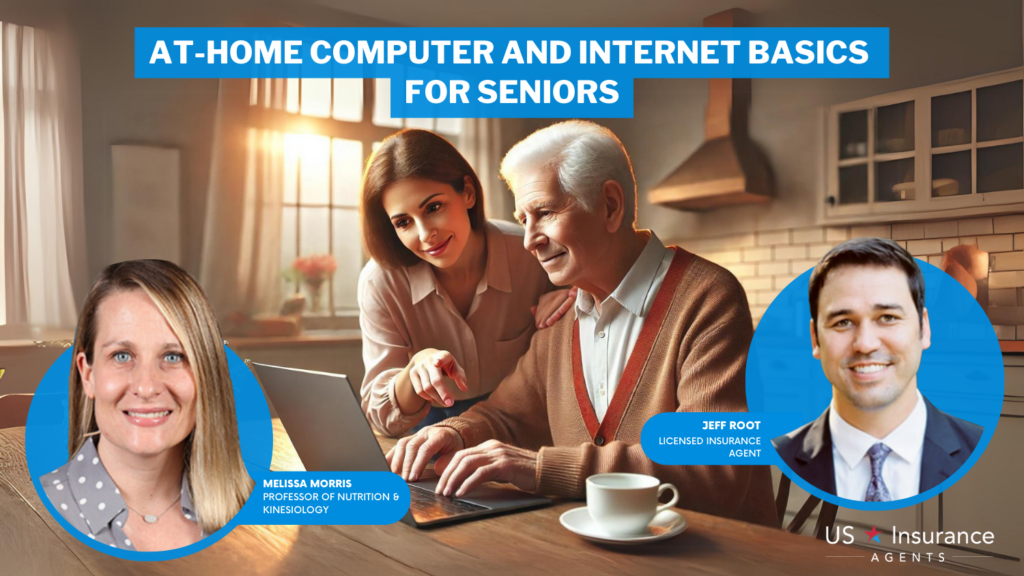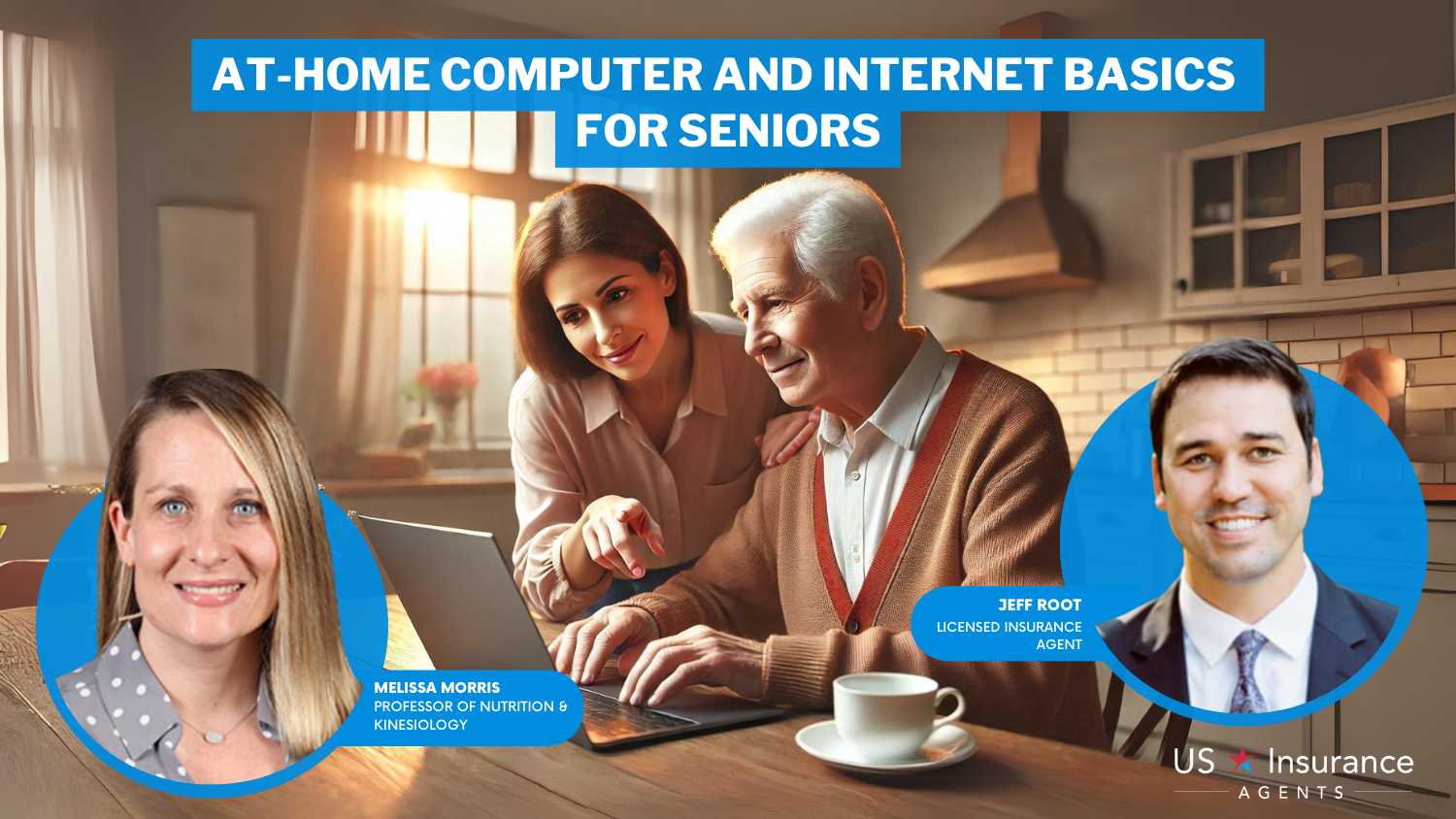At-Home Computer and Internet Basics for Seniors
Empower yourself with invaluable resources and expert guidance to help seniors navigate technology and the internet from the comfort of their homes. Our comprehensive guide provides step-by-step instructions, helpful tips, and practical advice on using computers, browsing the internet, staying safe online, utilizing email and social media, and connecting with loved ones.
Read more Secured with SHA-256 Encryption





Table of Contents
Table of Contents


Professor of Nutrition & Kinesiology
Melissa Morris has a BS and MS in exercise science and a doctorate in educational leadership. She is an ACSM certified exercise physiologist and an ISSN certified sports nutritionist. She teaches nutrition and applied kinesiology at the University of Tampa. She has been featured on Yahoo, HuffPost, Eat This, Bulletproof, LIVESTRONG, Toast Fried, The Trusty Spotter, Best Company, Healthl...
Melissa Morris


Sr. Director of Content
Sara Routhier, Senior Director of Content, has professional experience as an educator, SEO specialist, and content marketer. She has over 10 years of experience in the insurance industry. As a researcher, data nerd, writer, and editor, she strives to curate educational, enlightening articles that provide you with the must-know facts and best-kept secrets within the overwhelming world of insurance....
Sara Routhier


Licensed Insurance Agent
Jeff is a well-known speaker and expert in life insurance and financial planning. He has spoken at top insurance conferences around the U.S., including the InsuranceNewsNet Super Conference, the 8% Nation Insurance Wealth Conference, and the Digital Life Insurance Agent Mastermind. He has been featured and quoted in Nerdwallet, Bloomberg, Forbes, U.S. News & Money, USA Today, and other leading...
Jeff Root
Updated October 2024
Welcome to our comprehensive guide on At-Home Computer and Internet Basics for Seniors. If you’re a senior looking to enhance your digital skills and navigate the online world from the comfort of your home, you’ve come to the right place.

In this article, we will cover key topics such as using computers, browsing the internet, email and social media, online safety, and staying connected with loved ones. Our goal is to empower you with step-by-step instructions, practical tips, and expert advice to master the essentials of computer and internet usage.
Ready to explore the digital realm? Enter your zip code now to compare rates from the best insurance providers and ensure you have the coverage you need for a worry-free online experience. Embrace technology with confidence and stay connected to the world from the comfort of your home.
Computer Basics for Seniors
As with all other subjects, effective learning should start with the basics.
A good foundation on how computers and the internet work would greatly beneficial for seniors who are eager to improve their technological literacy.
There are a lot of online courses available online that are specifically designed to accommodate older adults. In addition, if you need a more in-person approach, most local libraries offer free computer classes for the elderly on their premises. Going for physical classes where you can ask questions of instructors while also learning and socializing with other people in the same situation can make the learning process faster.
Resources:
- Collierville Library: Online computer tutorials
- State Library of Iowa: Computer class lesson plans
Free Home Insurance Comparison
Compare Quotes From Top Companies and Save
Secured with SHA-256 Encryption
PCs vs. Apples vs. Tablet vs. Chromebook
If you are still looking for a gadget to buy or just wondering how these popular ones differ from each other, first do some research to learn which one would suit your needs and abilities the best.
PCs (personal computers): This is the one you may be most familiar with although they may look vastly different from the bulkier models of the 1990s and the early 2000s. Due to their bigger hardware, PCs are meant to be used in the home or office.
Apple gadgets: Apple is a popular brand of computing devices. They offer a variety of gadgets including smartphones, laptops, tablets, and computer accessories. The brand is most popular for the iPhone series of smartphones.
Tablet: A tablet is like an enlarged smartphone complete with the touchscreen, internet connectivity, and sometimes calling and texting features as well. This device is perfect for light internet browsing, playing games, and communicating. Another perk it has is that it is portable as well.
Chromebook: This is a new type of laptop computer designed by Google. It is different from traditional laptops because most of the data and programs reside in the Cloud instead of on the device itself. This allows the device to be faster and less prone to lag but may require a steady internet connection.
Resources:
- Twinsburg Library: Computer basics for seniors
- National Council for Aging Care: How to become tech-savvy seniors in 10 days
Keyboard, Mouse and Other Input Devices
Input devices are hardware parts of a computer or device that are used to convey data and control signals to the device’s operating system. In simpler words, they are the parts responsible for controlling the computer.
Keyboard: A keyboard is an input device that is made of rows of buttons or keys that correspond with a character (letters, numbers, or symbols) used for inputting text onto the computer.
Mouse: The mouse is an input device used to point and click on the buttons and icons on the monitor of a device.
Touchpad/screen: Found on tablets and smartphones (sometimes in laptops as well), this device replaces the keyboard and mouse to perform input functions.
Resources:
- GCF Global: Computer basics – Basic parts of a computer
- Cincinnati Library: Computers for beginners
Software
The word software pertains to the programs or applications (apps) that tell the computer how to work. These programs can be grouped into three categories according to their function.
Application software: This category refers to programs responsible for performing tasks from something as simple as word processing (Microsoft Word) to a task as complex as video editing (Windows Moviemaker).
System software: These types of software are what keeps your computer operating, hence they are also called operating systems (Windows 98, Windows Vista, Windows 10, etc.). Every computer requires an operating system to function.
Computer programming tools: These perform more technical functions than application software and are typically used for translating or combining program source codes.
Resources:
- Metro Detroit Linux Users Group: Software basics
- Urban Libraries Council: Basic computer and internet program for seniors
Free Home Insurance Comparison
Compare Quotes From Top Companies and Save
Secured with SHA-256 Encryption
Internet Basics for Seniors
The Internet can serve as a gateway to a new world for seniors. It can lead to interesting pages and communities for hobbies, let you connect with faraway family and friends, and even pay bills online.
If you are an absolute beginner, it might be a good idea to have someone help you familiarize yourself with the jargon and programs you will need to surf the web.
Resources:
- Senior Navigator: Using the internet for seniors: Beginner’s guide
- The Caregiver Space: Getting seniors online for fun and learning
Computer and Internet Security for Seniors
As relatively new citizens of the online landscape, older adults are more prone to Internet scams and harmful viruses. You must be careful whenever you log online. Here are some useful tips to follow.
- Use unique and strong passwords for every account.
- Take advantage of privacy settings on social media
- Be careful of what information you publicly share on your accounts.
- Don’t respond to spam or any other suspicious emails.
Resources:
- Connect Safely: The senior’s guide to online safety
- Safe and Secure Online: Seniors
- Guideposts: 10 cyber security best practices for older adults
Computer Maintenance
You need to take care of your devices to avoid losing money on constant repairs or debugging. For starters, research about anti-virus software and install a good one on your device. Perform regular scans to ensure that your device is not compromised.
When it comes to hardware maintenance, remember to keep your devices clean by not using or keeping them in dusty or humid areas. Also, avoid completely draining your devices’ batteries before charging them. In addition, refrain from overcharging them as well as it can cause damage.
Resource:
- Benton Foundation: Helping seniors bridge the digital divide
- Nursing Home Law Center: A senior’s guide to computer basics
Free Home Insurance Comparison
Compare Quotes From Top Companies and Save
Secured with SHA-256 Encryption
Additional Help
Would you like to know how seniors are using the internet today? The World Economic Forum is a great place to start. Check out their page on How the internet is connecting the elderly. Pew Internet also has some facts and figures available on their page, Older adults and technology use.

Frequently Asked Questions
What are some basic computer skills that seniors should know?
Seniors should have a basic understanding of how to use a computer, including how to turn it on and off, navigate the desktop and menus, use a mouse or touchpad, and type on a keyboard. They should also know how to open and close applications, use search engines, and send and receive emails.
What are some common internet terms that seniors should be familiar with?
Seniors should be familiar with common internet terms such as web browser, search engine, URL, hyperlink, and download. They should also understand terms related to online security, such as password, antivirus, firewall, and phishing.
What are some tips for staying safe online?
Seniors should always use strong, unique passwords for each online account and avoid using the same password for multiple accounts. They should also be cautious when clicking on links or downloading attachments in emails or on websites, as these can often contain viruses or other malware. Additionally, they should use antivirus and firewall software to protect their devices from malicious attacks.
What are some common scams that seniors should be aware of?
Seniors are often targeted by scammers, who may try to trick them into giving away personal information or money. Common scams include fake tech support calls or emails, phishing emails that appear to be from legitimate organizations, and online dating scams. Seniors should be wary of any unsolicited emails or phone calls asking for personal or financial information, and should always verify the identity of the person or organization before providing any information.
How can seniors get help with computer and internet issues?
Seniors can get help with computer and internet issues by contacting their internet service provider or computer manufacturer for technical support. They can also seek assistance from family members or friends who are knowledgeable about technology, or attend classes or workshops at local community centers or libraries.
Get a FREE Quote in Minutes
Insurance rates change constantly — we help you stay ahead by making it easy to compare top options and save.








